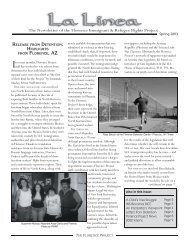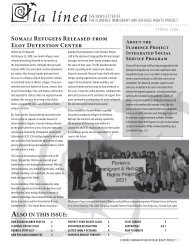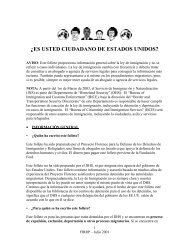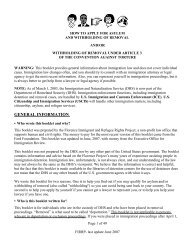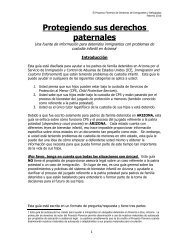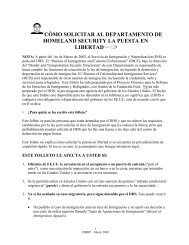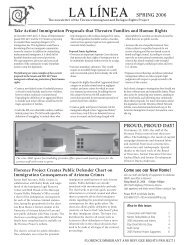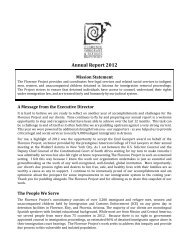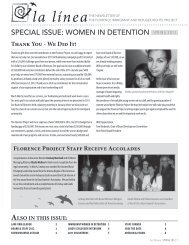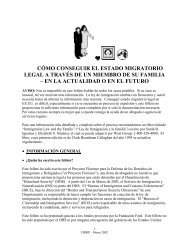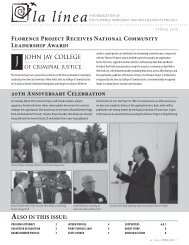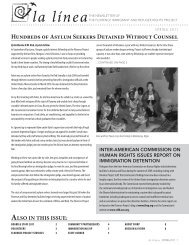quick reference chart and annotations for determining immigration ...
quick reference chart and annotations for determining immigration ...
quick reference chart and annotations for determining immigration ...
Create successful ePaper yourself
Turn your PDF publications into a flip-book with our unique Google optimized e-Paper software.
Immigrant Legal Resource Center, Florence Immigrant <strong>and</strong> Refugee Rights Project,<br />
Maricopa County Public Defender August 2012<br />
Stalking. Defense counsel should try to plead to an intent to annoy or offend <strong>and</strong> avoid any mention of<br />
threats to inflict physical harm.<br />
71. Harassment, ARS § 13-2921<br />
A. A person commits harassment if, with intent to harass or with knowledge that the person is harassing<br />
another person, causing a reasonable person to be seriously alarmed, annoyed or harassed <strong>and</strong> the conduct<br />
in fact seriously alarms, annoys or harasses the person, does the following:<br />
1. Anonymously or otherwise communicates or causes a communication with another person by verbal,<br />
electronic, mechanical, telegraphic, telephonic or written means in a manner that harasses.<br />
2. Continues to follow another person in or about a public place <strong>for</strong> no legitimate purpose after being<br />
asked to desist.<br />
3. Repeatedly commits an act or acts that harass another person.<br />
4. Surveils or causes another person to surveil a person <strong>for</strong> no legitimate purpose.<br />
5. On more than one occasion makes a false report to a law en<strong>for</strong>cement, credit or social service agency.<br />
6. Interferes with the delivery of any public or regulated utility to a person.<br />
C. Harassment under subsection A is a class 1 misdemeanor. Harassment under subsection B (public<br />
employee) is a class 5 felony.<br />
E. For purposes of this section, "harassment" means conduct directed at a specific person which would<br />
cause a reasonable person to be seriously alarmed, annoyed or harassed <strong>and</strong> the conduct in fact seriously<br />
alarms, annoys or harasses the person.<br />
Summary: This is a possible alternative to stalking, to avoid <strong>immigration</strong> consequences.<br />
Crime Involving Moral Turpitude (CMT): No, because it does not require the transmission of<br />
threats or intent to harm or the intent to commit a CMT. However, in practice, some <strong>immigration</strong> judges<br />
may find it to be a CMT.<br />
Aggravated Felony: No, because as a class 1 misdemeanor simple harassment has a maximum<br />
six-month sentence. Additional time imposed <strong>for</strong> recidivist behavior will be counted toward the required<br />
one-year sentence. See Note: Sentences.<br />
Domestic violence ground: If the record shows that the victim had a domestic relationship with<br />
the defendant (either by § 13-3601 or other evidence in the record), the offense might be held to cause<br />
deportability under the domestic violence ground at 8 USC §1227(a)(2)(E) as a crime of stalking.<br />
However, it is a better alternative than §13-2923, Stalking.<br />
A conviction of “stalking” is a basis <strong>for</strong> deportation under 8 USC §1227(a)(2)(E). While stalking<br />
remains an undefined term in this context, it is unlikely that §13-2921 would categorically come within<br />
this because it involves no threats <strong>and</strong> can result only in annoying the person. See Malta-Espinoza v.<br />
Gonzales, 478 F.3d 1080 (9th Cir. 2000) (conviction under Cal. Penal Code § 646.9 is not categorically a<br />
crime of violence because it need not be proven that the defendant had the intent, or the ability to carry<br />
out, the threat). A plea that left open the possibility of conviction under A6 might especially avoid this<br />
possibility. Also, <strong>immigration</strong> counsel will argue that the existence of the more serious §13-2923 argues<br />
against this categorization, <strong>and</strong> stalking should be defined as more harmful than merely “annoying.”<br />
Note that a civil or criminal finding that a noncitizen violated a domestic violence protection<br />
order is a basis <strong>for</strong> deportability. See 8 USC § 1227(a)(2)(E)(i). To the extent the § 13-3601 conviction<br />
Arizona Criminal Chart with Explanatory Endnote – August 2012<br />
80



